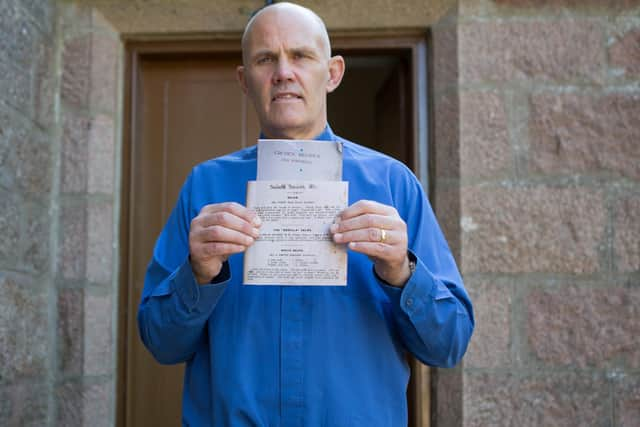Dracula’s links to Aberdeenshire strengthened after church renovation discovery
An Aberdeenshire church can stake a claim to have been indirectly funded by Bram Stoker’s Dracula, as it emerged that the world famous author’s wife raised funds to help renovate it with a cooking recipe inspired by the novel.
Florence Balcombe contributed the recipe for the “Dracula Salad” to a pamphlet sold in aid of Cruden Parish Church shortly after her husband Bram Stoker died in 1912.
Advertisement
Hide AdAdvertisement
Hide AdThe entry reads “Arrange alternative slices of ripe tomatoes and ripe purple egg shaped plums in dish and dress with oil and vinegar French Dressing”.


All the proceeds from the sale of “Cruden Recipes and Wrinkles” went towards building an extension at Cruden Parish Church, which dates back to 1776, to house an organ.
Minister, Rev Sean Swindells, revealed the Irish author’s fascinating association with the congregation in an online reflection - an illustration that while the building is currently closed, the church is “always open”.
Bram Stoker, who was raised in the Church of Ireland, was a regular visitor to Cruden Bay between 1893 and 1910 and wrote the early chapters of Dracula, published in 1897, there, famously staying at the Kilmarnock Arms Hotel.
It’s said he took the inspiration for Castle Dracula from nearby Slains Castle, a ruined clifftop fortress which has a distinctive octagonal hall which matches the description of a room in the classic vampire novel.
Florence Balcombe, a former suitor of the poet and playwright, Oscar Wilde, is said to have spent a lot of her time playing golf in Cruden Bay and meeting with friends while her husband was writing.
Mr Swindells said: “For each day of lock down, I have been publishing a reflection on the church Facebook page and website and we have held online Bible study groups, Sunday evening services and provided pastoral support via phone and email.
“To keep things fresh and relevant this has included some key historical figures like Bram Stoker and to date the most popular reflection appears to be the one about the blood sucking Count Dracula that we published earlier this week.
Advertisement
Hide AdAdvertisement
Hide Ad“It is a fascinating piece of history but of course within the Christian religion, the shedding of blood through sacrifice for the forgiveness of sins, takes on a completely new dimension.
“Rather than the sacrifice of an animal, Jesus the Messiah and Son of God, becomes the sacrifice.
“His shedding of blood and death by the Romans through crucifixion, is seen as a once for all cosmic act of forgiveness.”
London-based Bram (Abraham) Stoker wrote two other books in Cruden Bay - The Watter's Mou' (1895) and The Mystery of the Sea (1902) - but remains most famous for Dracula.
The eponymous character has been brought to life on the silver screen by actors Christopher Lee and Gary Oldman.
Cruden Bay resident, Mike Shepherd, author of When Brave Men Shudder: The Scottish origins of Dracula, said: “Bram Stoker fell in love with the village and used it as his writing den, returning year after year for at least 12 summers to write his books.
“He was a part-time author and he ran the Lyceum Theatre in London which was owned by the most famous actor in the world at the time, Henry Irving.
“Stoker would get a month off every summer when the theatre shut down and while he wrote Florence played golf in the village and had friends there.
Advertisement
Hide AdAdvertisement
Hide Ad“She submitted two recipes for the pamphlet, including the Dracula Salad, because of the links between her late husband, Cruden Bay and Dracula.”
A message from the Editor:
Thank you for reading this story on our website. While I have your attention, I also have an important request to make of you.
The dramatic events of 2020 are having a major impact on many of our advertisers - and consequently the revenue we receive. We are now more reliant than ever on you taking out a digital subscription to support our journalism.
Subscribe to scotsman.com and enjoy unlimited access to Scottish news and information online and on our app. Visit https://www.scotsman.com/subscriptions now to sign up.
By supporting us, we are able to support you in providing trusted, fact-checked content for this website.
Joy Yates
Editorial Director
Comments
Want to join the conversation? Please or to comment on this article.